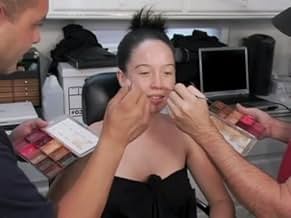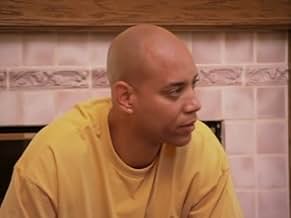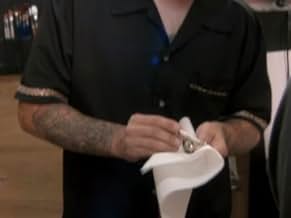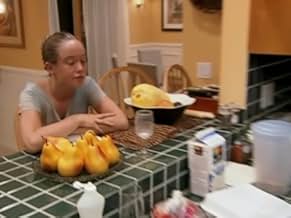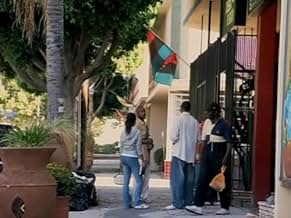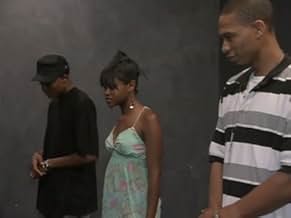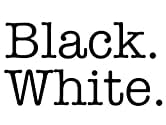Ajouter une intrigue dans votre langueA white family and a black family find out what it's like to switch lives.A white family and a black family find out what it's like to switch lives.A white family and a black family find out what it's like to switch lives.
- A remporté 1 prix Primetime Emmy
- 1 victoire et 1 nomination au total
Parcourir les épisodes
Avis en vedette
I thought this was a very well developed idea that works on many different levels. First, we have the two "average" families composed of two parents and a child. The white family seems a little more offbeat with the overly accepting mother and the father who doesn't seem to see the racism in anything that happens around him. The daughter seems to be the only member of the family that is learning anything somewhat valuable during the whole transition. The black family seems to be more down-to-earth and likable. The father enjoys being "treated" as a white man and using the "white" talk that is often used as a hyper reality mockery of the formal talk that dave chapelle is usually found using when imitating/mocking the way white people talk. The mother is somewhat easygoing but gets irritated when listening to the ditsy white mother imitate "black" talk. The son is just a normal, shy kid who doesn't feel like he has to "act white" because he feels like he will be accepted for who he is. The way ideas clash between the families during their ventures out into LA are very interesting and sometimes comical. This is a great show for everyone and I hope that more people take to such a good thought provoking show about racial tension in the modern day.
Network: FX; Genre: Reality, Documentary; Content Rating: TV-MA (strong language); Perspective: Contemporary (star range: 1 - 4);
Seasons Reviewed: Complete Series (1 season)
I love FX. Even when their shows aren't very good, they are still so bold and unique that they thrash about making a formidable fight. "Black. White." is a 1-shot, 6 episode series developed by R. J. Cutler and Ice Cube - lending his celebrity name and a halfway decent theme song to "the project" - about two families who employ an elaborate Hollywood make-up regimen to "trade races", making the white family (Bruno, Carmen and daughter Rose) appear black and the black family (Brian, Renee, and son Nick) appear white. Creepy? Maybe a little, but we've never seen this before, which is always a find in the creatively dead and socially irresponsible reality genre.
It starts out fun enough. It's fascinating watching the family members react to each other's new appearance. The opportunity they are given to walk around looking like someone other than themselves, is a cathartic human curiosity that goes beyond race and ethnicity. Brian gets his white make-over and goes straight to the driving range, then gets treatment from a shoe salesman I've never heard of life-long white men getting. Bruno, on the other hand, relishes what he will do when first called the N-word while in black make-up. But after the first episode, which also includes a test group where the two races hear what others think of them (the show's provocative high point), the fun is pretty much gives way to standard reality series impulses.
From there, you can take "Black. White." one of two ways: as a reality series or as a social experiment. Taken simply as a reality show it is decidedly above the rest, and both families have enough emotional baggage to pass the mustard for simple, interesting TV. End of that review.
But like Actual Reality's other FX series, the entertaining "30 Days", Cutler and Cube want "Black. White." to be more. They want to make us think. They want to break down the wall of self-segregation that these two races erect for themselves. For the duration of the project the families are made to live together so that they will share their experiences, and, hopefully, have intellectual discussions on the state of race relations in America. Because talking is the first step toward fixing the problem - right? But it isn't long before the women are at each others throats just like in any other reality show.
For all of its good intentions, in choosing these particular people as its participants they force us to debate a false reality. Instead of showing the national battle between black and white, "Black" actually ends up showing the battle between blacks and liberals, with Carmen as the prototype for someone who thinks that because her parents where involved with the civil rights movement, that she's got the right idea about race, all the while not realize that every "tolerant", "open-minded" idea she has toward black people is rooted in a weird core belief that they are SO different that they need to be understood like "creatures" as she puts it and coddled in society. Renee notes that Carmen treats her like an alien.
The subjects quickly prove themselves to be too kooky; saying things and making social mistakes that the average person really wouldn't say or do. We constantly feel like we are smarter than they are and as a result, can't learn anything from them. Is it all about skin color? Is racism perceived or indoctrinated? Any message the show was going for in the first place gets muddled, falling back on the old "there are no easy answers" line and refusing to pose any theories. Any hope of getting people to talk about race evaporates the moment Bruno showcases his own (hold on ) rap video.
The guys are pretty cool, but as guinea pigs, both Bruno and Brian are so hell bent on proving their take on racism they, frustratingly, won't even consider another view. Bruno (a pompous ass who views the world through the prism of himself), to prove that people see racism because they are looking for it, and Brian who takes the traditional line that black people are immersed in white culture and are constantly being sized up every where they go (like teenagers) by whites. When racist things don't happen, Brian and Renee assume that it would have happened had they not been in white make-up. For her part, Renee befriends a white women outside the project, deciding that she can be friends with her - not because she has learned anything about "the white experience", but because of the understanding way the women treats her. It is still all about her.
The show completely falls apart as an experiment when it starts to obviously take Brian's side. The last half of the series is less about two different ethnicities learning about each other and becomes a cliché, sanctimonious sermon, the yardstick for success of which is how well it can beat into Bruno, Carmen and us how victimized black America is. "Black" has a view of race no deeper than surface-level stereotypes.
What does work about "Black.White" are the kids. Rose, the overly emotional daughter, is ripped apart having to lie to her new friends in a black poetry group. A bond forms between her, Brian and Renee and the series rightly climaxes at Rose's poetry showcase.
Nick, who in white face looks like Michael Jackson but hilariously won't change the way he speaks, is equally hell bent, but on learning absolutely nothing. The most fascinating storyline in the show involves Nick's disrespect for money, his ignorance over the use of the N-word and the fact that he doesn't see things in terms of race until his parents train him to see it.
* * / 4
Seasons Reviewed: Complete Series (1 season)
I love FX. Even when their shows aren't very good, they are still so bold and unique that they thrash about making a formidable fight. "Black. White." is a 1-shot, 6 episode series developed by R. J. Cutler and Ice Cube - lending his celebrity name and a halfway decent theme song to "the project" - about two families who employ an elaborate Hollywood make-up regimen to "trade races", making the white family (Bruno, Carmen and daughter Rose) appear black and the black family (Brian, Renee, and son Nick) appear white. Creepy? Maybe a little, but we've never seen this before, which is always a find in the creatively dead and socially irresponsible reality genre.
It starts out fun enough. It's fascinating watching the family members react to each other's new appearance. The opportunity they are given to walk around looking like someone other than themselves, is a cathartic human curiosity that goes beyond race and ethnicity. Brian gets his white make-over and goes straight to the driving range, then gets treatment from a shoe salesman I've never heard of life-long white men getting. Bruno, on the other hand, relishes what he will do when first called the N-word while in black make-up. But after the first episode, which also includes a test group where the two races hear what others think of them (the show's provocative high point), the fun is pretty much gives way to standard reality series impulses.
From there, you can take "Black. White." one of two ways: as a reality series or as a social experiment. Taken simply as a reality show it is decidedly above the rest, and both families have enough emotional baggage to pass the mustard for simple, interesting TV. End of that review.
But like Actual Reality's other FX series, the entertaining "30 Days", Cutler and Cube want "Black. White." to be more. They want to make us think. They want to break down the wall of self-segregation that these two races erect for themselves. For the duration of the project the families are made to live together so that they will share their experiences, and, hopefully, have intellectual discussions on the state of race relations in America. Because talking is the first step toward fixing the problem - right? But it isn't long before the women are at each others throats just like in any other reality show.
For all of its good intentions, in choosing these particular people as its participants they force us to debate a false reality. Instead of showing the national battle between black and white, "Black" actually ends up showing the battle between blacks and liberals, with Carmen as the prototype for someone who thinks that because her parents where involved with the civil rights movement, that she's got the right idea about race, all the while not realize that every "tolerant", "open-minded" idea she has toward black people is rooted in a weird core belief that they are SO different that they need to be understood like "creatures" as she puts it and coddled in society. Renee notes that Carmen treats her like an alien.
The subjects quickly prove themselves to be too kooky; saying things and making social mistakes that the average person really wouldn't say or do. We constantly feel like we are smarter than they are and as a result, can't learn anything from them. Is it all about skin color? Is racism perceived or indoctrinated? Any message the show was going for in the first place gets muddled, falling back on the old "there are no easy answers" line and refusing to pose any theories. Any hope of getting people to talk about race evaporates the moment Bruno showcases his own (hold on ) rap video.
The guys are pretty cool, but as guinea pigs, both Bruno and Brian are so hell bent on proving their take on racism they, frustratingly, won't even consider another view. Bruno (a pompous ass who views the world through the prism of himself), to prove that people see racism because they are looking for it, and Brian who takes the traditional line that black people are immersed in white culture and are constantly being sized up every where they go (like teenagers) by whites. When racist things don't happen, Brian and Renee assume that it would have happened had they not been in white make-up. For her part, Renee befriends a white women outside the project, deciding that she can be friends with her - not because she has learned anything about "the white experience", but because of the understanding way the women treats her. It is still all about her.
The show completely falls apart as an experiment when it starts to obviously take Brian's side. The last half of the series is less about two different ethnicities learning about each other and becomes a cliché, sanctimonious sermon, the yardstick for success of which is how well it can beat into Bruno, Carmen and us how victimized black America is. "Black" has a view of race no deeper than surface-level stereotypes.
What does work about "Black.White" are the kids. Rose, the overly emotional daughter, is ripped apart having to lie to her new friends in a black poetry group. A bond forms between her, Brian and Renee and the series rightly climaxes at Rose's poetry showcase.
Nick, who in white face looks like Michael Jackson but hilariously won't change the way he speaks, is equally hell bent, but on learning absolutely nothing. The most fascinating storyline in the show involves Nick's disrespect for money, his ignorance over the use of the N-word and the fact that he doesn't see things in terms of race until his parents train him to see it.
* * / 4
Firstly, i suppose i'm the 'other side' to dee.reid's 20 yo black male, as i'm a 40 yo white female. I found his comments very articulate and meaningful. I agree that this show illustrates issues in our society which many choose to ignore or are afraid to deal with. Yet they MUST be talked about and solutions made to how we can deal with racism in our society, and hopefully one day eliminate it. I believe that it's necessary for each of us to empathize with the other in order to see what life is like for both/each. We are different - different races/cultures/beliefs - but that's not a bad thing, and that's NOT cause to judge or bias one as being better-than or worse or uglier or whatever. It IS possible to raise your child to believe in tolerance and appreciation and respect of ALL people. We must also strive to see what is THE SAME in all of us. We all feel the need to be loved and accepted and respected and trusted. We all feel the priorities of love and partnership, health, family, home, faith, happiness, career, charity, patriotism. This is illustrated in our everyday lives. It's important to see these similar values in order to respect one another, despite our more obvious 'visual' differences. I must say that i was surprised in the show to see how blacks felt that whites felt about them in everyday situations (ie mall, shopping). It saddened me. I mean I knew that it existed, but i guess i hoped that it was more the exception than the rule. I hope that my upbringing did not give me any subconscious behaviors that may be construed as discriminatory, so i'm looking at this more closely. This is a first step. I certainly don't outwardly feel any difference toward blacks than whites; i tend to look at just 'people', and i try to empathize with people who do feel genuine discrimination. While i may not understand black issues completely i think i can see that we have a long way to go before we're at a more comfortable level with each other and that mutual understanding, respect and changing the way of negative behaviors is a good first step. It doesn't hurt to educate yourself about each others culture, as this show is attempting to do. I hope people can see this program in that light, instead of a more cynical way that it's an exploitation of races. I hope that blacks know that more and more whites are less tolerant of the racism of the past, and that with each generation it is dissolved a bit more. At least we are departing from the 'us and them' way of thinking. So this is what I plan to do..and also, of course, continue to raise my 12 yo son, who is bi-racial btw (Chinese, Hawaiian, Caucasian) and also watches and likes this new program, to see each others as people, American and otherwise, with many colors, beliefs and cultures, and members of the Human Race. We like the show and will continue to watch.
I don't get it. I watched the show tonight and it blew my mind. We all get it Carmen is an idiot, but I really think shes trying. She is doing anything and everything she can to be black and every time she does all she gets in return is hate. She asked for help on what to wear and she was lied to. I thought this project was supposed to be about the families showing one another and teaching one another what it is to be the opposite race. Nick and Renee are black and they don't want to be anything else. They aren't even trying. Rose went out and gave of herself and worked to try and see the other side. Nick doesn't even care enough to try. I just don't understand why everything Bruno and Carmen try is crap to the Sparks. They went to church and they enjoyed it, all Brian had to say was that it wasn't real. I don't see Bruno saying that every time Brian is white. The show doest have that much credibility to me because I feel like the Spark's came into this house with the intent to show how racist white people are. They don't care about being white, they don't want to learn what its like to be white. All they want to do is show this white family what its like to be black. Carmen is lost she has no idea what to say or do around the other family and why should she ? Anytime she tries to learn how to be black they throw her in the gutter and say "Well I learned a lot from her today" they don't try and help her they don't correct her. From my point of view the Sparks are looking for a fight, not just outside the house but in the house as well. After any experience outside the house we get this commentary from the Sparks vehicle and its always criticism about how they felt hurt by something the Wurgles have said or done. I just don't think both families are trying very hard. I believe that Rose is the only one who is really getting anything out of this experience and she had to leave the house to get it. The only people who were actually real with her are the people who had no idea. For anyone to get something from this the effort has to go both ways.
...And I can honestly my jaw dropped. I just couldn't believe it. Hollywood makeup effects artist Keith VanderLaan (whose work on "Big Momma's House" and "White Chicks" has not gone unnoticed) has done the unthinkable by transforming a black family into a white family, and a white family into a black family. The Sparks, is the black family (Brian, his wife Renee, son Nick) from an Atlanta suburb and the white Wurgel-Marcotulli family (Carmen, her live-in boyfriend Bruno, Carmen's daughter Rose) from Santa Monica, California, must live together and walk and talk, as the opposite race.
Now before I heard about this show, courtesy of the rants of the many EB Soldiers at Public Enemy's official website message boards, I have to say I first met "Black. White." with great skepticism. But as I heard more about it, and even though I agree largely with the rants of the EB Soldiers, I was still enticed. I wanted to see more, and what I saw tonight was nothing short of an outstanding examination of how the black and white races interact with one another and as each other.
As a 20-year-old black male, "Black. White." not only forced to me to take into account what whites think and experience, but it also made room for me to ponder my own conceptions about myself, and my fellow brothers and sisters in America. Bruno and Carmen and Brian and Renee all attend separate black/white focus groups, in disguise, and each gets a taste of what the other race feels about the other race. Before the meetings, though, the participants gave their companions advice on how to "act" while listening to the discussion; Brian says Bruno should slouch a little bit and Bruno says Brian should keep an upright, or otherwise proper posture. We can see them nervously squirming in their seats as they all get anxious about the discussions taking place. I couldn't help but feel the heat too.
Hopefully, this show will open eyes, minds, and hearts about walking a mile in the shoes of somebody different. According to the Style section of today's Washington Post newspaper, the show's creator R.J. Cutler seems to know all about this sort of touchy reality thing. He produced "Super Size Me" (2004) filmmaker Morgan Spurlock's "30 Days" (damn, I really wanted to see that show), which frequently had similar role-swapping role-playing that included a fundamentalist Christian living with a Muslim family and a straight homophobe taking up residence in San Franciso's openly-gay Castro district.
Rapper Ice Cube, who is no stranger to politics and the racial divide in America, also did the opening theme song and is the show's co-producer and that should hopefully draw in more viewers, particularly those who pay attention to political hip-hop.
What we may see on "Black. White." may not be new to a lot of us, and I won't disagree with anyone who says otherwise. What it will do, I hope, is show what America is like from the other side for these six people. It shows much promise. The dynamics of racism, as portrayed often in the media, is sour compared to what really goes on out there. We can no longer turn a blind eye and a deaf ear to this cancerous epidemic in our country.
Now let's see what the other side says.
Now before I heard about this show, courtesy of the rants of the many EB Soldiers at Public Enemy's official website message boards, I have to say I first met "Black. White." with great skepticism. But as I heard more about it, and even though I agree largely with the rants of the EB Soldiers, I was still enticed. I wanted to see more, and what I saw tonight was nothing short of an outstanding examination of how the black and white races interact with one another and as each other.
As a 20-year-old black male, "Black. White." not only forced to me to take into account what whites think and experience, but it also made room for me to ponder my own conceptions about myself, and my fellow brothers and sisters in America. Bruno and Carmen and Brian and Renee all attend separate black/white focus groups, in disguise, and each gets a taste of what the other race feels about the other race. Before the meetings, though, the participants gave their companions advice on how to "act" while listening to the discussion; Brian says Bruno should slouch a little bit and Bruno says Brian should keep an upright, or otherwise proper posture. We can see them nervously squirming in their seats as they all get anxious about the discussions taking place. I couldn't help but feel the heat too.
Hopefully, this show will open eyes, minds, and hearts about walking a mile in the shoes of somebody different. According to the Style section of today's Washington Post newspaper, the show's creator R.J. Cutler seems to know all about this sort of touchy reality thing. He produced "Super Size Me" (2004) filmmaker Morgan Spurlock's "30 Days" (damn, I really wanted to see that show), which frequently had similar role-swapping role-playing that included a fundamentalist Christian living with a Muslim family and a straight homophobe taking up residence in San Franciso's openly-gay Castro district.
Rapper Ice Cube, who is no stranger to politics and the racial divide in America, also did the opening theme song and is the show's co-producer and that should hopefully draw in more viewers, particularly those who pay attention to political hip-hop.
What we may see on "Black. White." may not be new to a lot of us, and I won't disagree with anyone who says otherwise. What it will do, I hope, is show what America is like from the other side for these six people. It shows much promise. The dynamics of racism, as portrayed often in the media, is sour compared to what really goes on out there. We can no longer turn a blind eye and a deaf ear to this cancerous epidemic in our country.
Now let's see what the other side says.
Le saviez-vous
- AnecdotesA part of this experiment, was for the two families to live together in the same house. With their false identities, they found jobs, enrolled their kids in schools and at the end of each day shared their interactions amongst each other.
- ConnexionsReferenced in Alex Meyers: the new Hunger Games movie is kinda dumb... (2024)
Meilleurs choix
Connectez-vous pour évaluer et surveiller les recommandations personnalisées
- How many seasons does Black. White. have?Propulsé par Alexa
Détails
- Couleur
Contribuer à cette page
Suggérer une modification ou ajouter du contenu manquant




